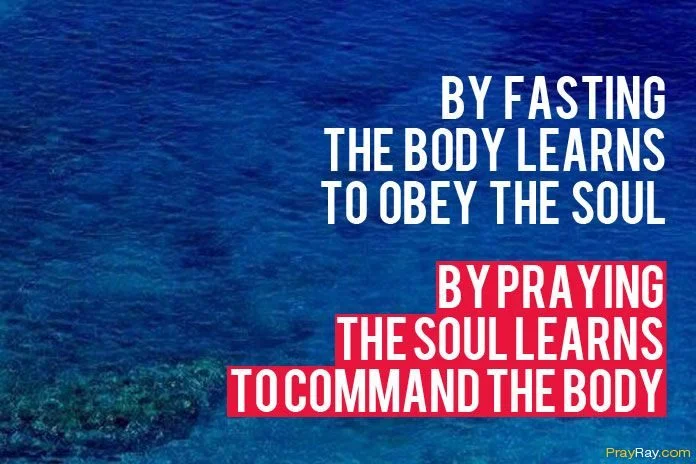Jesus said to his disciples, “This kind can come out by nothing but fasting and prayer.” (Mark 9:29). You may ask, what ‘kind’ was Jesus referring to? Who was Jesus referring to? The kind of demon the disciples faced could only come from the possessed body through fasting and prayer. This article considers fasting and prayer as a Christian spiritual discipline, its importance and benefits, and how to fast and pray.
What is fasting?
Fasting is where a person sustains from foods to deepen their spiritual growth because of an overwhelming spiritual hunger. The Greek word ‘nesteuo’ and the Hebrew word ‘tsum’ means to abstain from food. If a person is said to be fasting, the individual sacrifices the desires of the flesh (sacrificing meals and foods) for the things of the spirit, i.e., meditation, fasting, and prayer.
Fasting breaks the chains of bondage and frees us from the things which bind us to the world of materialism and our surroundings.
Fasting enables a person to refocus their attention on the things of God and His commandments. It calls us to face and overcome the enemy’s plan. Jesus himself said, “It is written: ‘Man shall not live on bread alone, but on every word, that comes from the mouth of God” (Matthew 4:4). Whilst men may live on substances (such as bread), as food for the physical body, God can support both physical and spiritual life by other means.
God, who is the word, feeds us with His word, and therefore in a fasting period, we too must study and meditate on the word of God, which comes from God himself.
Jesus saw the importance and the necessity of fasting. Jesus fasted before his temptation by Satan (Matthew 4:1-11). He fasted 40 days and nights (4:2) before commencing His public ministry. Personal attacks came after His fasting (4:3, 6, 9).
However, despite the personal attacks and Jesus being physically weak, He was spiritually strong and well-prepared for the temptation. Therefore, fasting brings spiritual strength to combat the temptations that will arise.
Fasting must be sincere. Isaiah 58:3-6 highlights how Isaiah rebuked the nation of Israel for their insincere fast.
‘Why have we fasted,’ they say, ‘and you have not seen it? Why have we humbled ourselves, and you have not noticed?’ “Yet on the day of your fasting, you do as you please and exploit all your workers. Your fasting ends in quarrelling and strife and striking each other with wicked fists. You cannot fast as you do today and expect your voice to be heard on high. Is this the kind of fast I have chosen, only a day for people to humble themselves?
Is it only for bowing one’s head like a reed and for lying in sackcloth and ashes? Is that what you call a fast, a day acceptable to the Lord? Is not this the kind of fasting I have chosen: to loose the chains of injustice and untie the cords of the yoke, to set the oppressed free and break every yoke?”
While fasting can have physical and spiritual benefits, God requires sincere fasting. Then, those wrongly imprisoned are set free, and every yoke is broken.
Why fasting and prayer as Christian spiritual discipline should be combined?
For fasting to be effective, it must be accompanied by prayer. The Greek word ‘Proseuche’ means prayer addressed to God. The Hebrew word ‘Palal’ suggests the act of intercession and supplication.
Fasting, therefore, should not be simply a ‘non-eating’ exercise. According to research, fasting does have many health benefits, such as weight loss, reduced cholesterol as well as it helps to lower blood pressure. Fasting must be combined with prayer; otherwise, fasting will become a health-conscious activity to reduce weight loss. Therefore, fasting and prayer are essential Christian spiritual disciplines that apply to every Christian.
For example, Daniel prayed to the Lord, in fasting, sackcloth and ashes, because of the desolation of Jerusalem. “So I turned to the Lord God and pleaded with him in prayer and petition, in fasting, and in sackcloth and ashes” (Daniel 9:3). David’s prayer and fasting were a heavy plea, requesting God would show mercy upon the people because of their sin and turning away from God; “We have sinned and done wrong. We have been wicked and have rebelled, we have turned away from your commands and laws” (Daniel 9:5).
Fasting and prayer is also Christian spiritual discipline to seek God’s guidance. Fasting and prayer were necessary for appointing leaders in the New Testament. When Paul and Barnabas required elders for each church in Antioch in Syria, they combined fasting and prayer, then committed the elders to the Lord, in whom they had put their confidence. “Paul and Barnabas appointed elders for them in each church and, with prayer and fasting, committed them to the Lord, in whom they had put their trust.” (Acts 14:23).
Benefits of combining fasting and prayer
Therefore, the combining of fasting and prayer is vital because it enables Christians to gain:
- a closer relationship with God
- spiritual breakthrough
- a greater level of self-discipline
The Bible teaches us to fast and pray; “Pray continually” (1 Thessalonians 5:17); “Even now,” declares the LORD, “return to me with all your heart, with fasting and weeping and mourning.” (Joel 2:12).
How to fast and pray
For prayers to be received by God, they must be offered with the right motives. “When you ask, you do not receive, because you ask with wrong motives, that you may spend what you get on your pleasures” (James 4:3). Therefore, “the prayer of a righteous person is powerful and effective” (James 5:16).
To pray effectively, you should:
- Acknowledge who He is. The Lord’s prayer is a good starting point to recognize who God is; our provider (Luke 11:2-3).
- Always pray with the right motives (James 4:3).
- Build a deep and personal relationship by recognizing Him as creator and King (Psalm 8:1).
- Don’t make your prayers complicated. Instead, use simple words in your prayers, i.e., ‘Lord, You are great.’ Do not pray like the hypocrites (Matthew 6:5-6).
- Ensure you read the Word of God when you pray. For example, you can read the Psalms to invigorate your prayers and apply the word to your heart (Psalm 119:105).
- Listening to music can help to focus your mind on God.
- Pray expectantly. Ask, seek, and knock (Matthew 7:7).
Fasting steps
Before you begin fasting, you mustn’t stop eating without combining your fast with prayer, meditation, and reading the Word of God. Therefore, when you fast, you should:
- Understand the spiritual purpose and benefits of your fast. Not planning your fast is simply going through a period without food.
- Start by missing perhaps one meal, then gradually move to two meals, and so on until you are happy to do a whole day fast.
- Know the different types of fasts you can engage in. For example, a regular fast is where you abstain from all food and liquids except water. This type of fast was evident in 2 Chronicles 20:3, where Jehoshaphat proclaimed a fast throughout all of Judah. In addition, there are other fasts, such as the Daniel Fast, where you eat only fruits and vegetables for a certain amount of time and abstain from meat (Daniel 1:8-14).
- Plan what you will do during the times when you would generally be eating meals. This will enable you to focus on the fast and its intended purpose and benefits.
Understanding the purpose of Christian fasting and prayer as a spiritual discipline will enable you to grow effectively as a Christian. Knowing how to fast and pray will also allow you to develop a deeper relationship with God and achieve greater self-discipline by applying these fundamental principles.
Also read: HOW TO PRAY TO GOD













